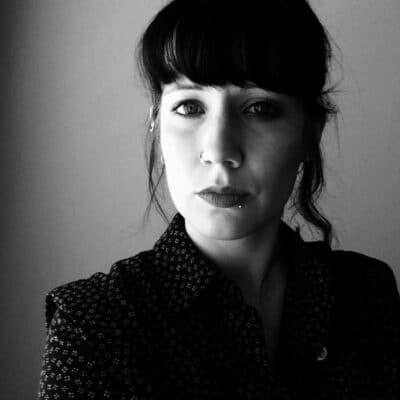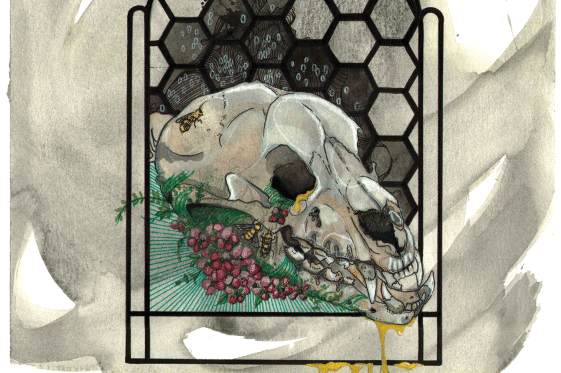Welcome to April, the “cruelest month” according to T.S. Eliot in his classic poem “The Waste Land,” but here at Cease, Cows, April isn’t cruel at all—it’s time to celebrate National Poetry Month with an interview with poet courtney marie, whose new collection, songs we used to dance to, is now available.
Purchase your copy here.
Chuck Augello: Tell us about your new poetry collection, songs we used to dance to. How do you like readers to approach your work.
courtney marie: i would like readers to approach this work just as they are. i want them to bring all their worries and broken pieces. i want us to be honest with each other. of course i can really only speak for myself but sometimes living feels unbearably heavy and it’s hard to know what to do with the overwhelm that comes with living in this world. we’re dealing with our personal battles while also faced with the cumulative nightmare that is late-stage capitalism, the climate crisis, corruption everywhere… now a pandemic. it’s too much, isn’t it? and to be predisposed to not want to live makes it all the more difficult to stay afloat. i think naming the things we are struggling with is better than pretending it’s not happening. i wrote this book because i want readers to know that they aren’t alone in all of this. that they aren’t the only ones falling apart while the world is falling apart. that at the very least we have each other.
CA: Ghosts make frequent appearances in your poems. What interests you in writing about ghosts?
courtney marie: ghost as recurring character: this shadow self is both a comfort and an annoyance. while writing these poems, she helped me articulate the experience of living with mental illness, specifically hypomania/mania. she has a mind of her own. she is overbearing and overconfident. she is fun and also makes terrible decisions. she’s a forest of contradictions. sometimes she triggers doubt, the existential crisis of WHO AM I. she comes and goes without warning. it was a way to process how this symptom has been both a friend and a destructive force in my life. i won’t give away the end. of course, she is not the only ghost here. she is a ghost surrounded by ghosts. i think they represent many things that have been lost or continue to linger, including the individual and collective traumas we all face. things from the past that refuse to stay in the past. the things that haunt us, keep us up at night.
CA: Some of your poems, like “if the world is ending,” include crossed-out lines. Why?
courtney marie: there are things that we say without saying or are too embarrassed to say or cannot say or second guess or even say and wish we could take back- the crossed-out lines in this book represent these lapses in communication. the unsayable things. it was a way for me to be more honest/vulnerable with the reader.
CA: There are several recurring themes in the book. Were the poems written intentionally toward these themes or did the themes emerge later?
courtney marie: honestly i didn’t really know what i was doing when i started this book. i just knew that it was going to be very personal and that i wanted to be brave. so i wrote about what i knew and the things i was grappling with and what i wanted people connect with, which is how it ended up carrying all these universal themes of existential struggle and millennial angst and desire for connection & hope & love, but also the very personal struggles of living with mental illness, surviving abuse/trauma, and wrestling with identity. even through the despair, i have a lot of hope in humanity & kindness & creativity and i hope those themes shine through as well.
CA: The book includes a poem titled, “how we survived a pandemic.” Did the pandemic influence the writing of this book?
courtney marie: after three years working on and off writing these poems, i found myself finishing the book during the pandemic and it felt like it would be a missed opportunity to not include the new but often familiar experience of intense isolation, fear, and doubt that suddenly overshadowed every aspect of our lives. the anxiety, longing, and struggle for survival/sanity fell in line with what the book was already doing, and besides, it was all i could think about some days, so i made an effort to include some of the unique existential terror that the pandemic instilled.
CA: What are some of the challenges in putting together a poetry collection rather than focusing on writing individual poems?
courtney marie: i’m not sure, since this collection started as individual poems that were later cobbled together into something more cohesive. the way i wrote this book was chaotic at best: all my first drafts were typed up on a typewriter so i ended up with piles of poems all over the place that i later sifted through, filling in the cracks and organizing in a way that could tell a bigger story. i will say it was unbelievably challenging to write a book about being mentally ill and living through trauma while actively being mentally ill and living through trauma. i almost gave up so many times. i still kind of wonder how i did it, and i’m grateful every day to the publisher for their patience with me and the angels in my life who keep me going even through the worst days.
CA: You are co-founder and director of the artist collective spiderweb salon. Tell us about it.
courtney marie: in short, spiderweb salon is a collective of artists and writers from all backgrounds and talents, coming together to create experience and community with each other. it’s something that i am immensely proud to have helped build over the last decade. together we’ve put on hundreds of art & performance showcases, made countless zines and other publications, raised thousands for community projects and nonprofits we believe in, shown work in major museums, put poetry on the radio, started a mental health project that helps artists get therapy and peer support, and on and on. the people, the projects, the ideas: it’s really magical. this all happens mostly in our hometown of denton, texas, but we’ve ventured across the country to collaborate with folks from other places too. it’s been a huge labor of love, and while the pandemic really knocked the wind out of our collective sails, i hope we’ll continue to gather and create together with gusto in the future.
CA: Who are some of the poets that have inspired or influenced you?
courtney marie: i’m honestly most inspired by the poets who i am in community with through spiderweb, and the many poets across the country who i have been honored to read beside and listen to and learn from over the years. there’s something about being on an intimate level with someone and really getting where they are coming from in their work. my friends inspire me to create and to dream. i love connecting with people over their art, and i love sharing art and poetry with others. there’s nothing better than a community full of admiration for one another and the drive to make the world a better and more beautiful place, and that’s what keeps me going.
CA: There’s no shortage of ways to spend one’s time. Why do you choose to write poetry?
courtney marie: i don’t really remember a time before i wrote poetry, but i remember the periods of time in my life when i didn’t write and they were bleak. i have always been a reader as well as a writer, so the call of the written word has forever had a hold on me. there’s something about putting words to paper and speaking those words out loud and sharing those words with others that feels like magic. call it poetry, call it a spell. i write, because i am.

–
Chuck Augello (Contributing Editor) is the author of The Revolving Heart, a Best Books of 2020 selection by Kirkus Reviews. His work has appeared in One Story, SmokeLong Quarterly, Literary Hub, The Coachella Review, and other fine journals. He publishes The Daily Vonnegut, a website exploring the life and art of Kurt Vonnegut. His novel, A Better Heart, was released in November 2021.
courtney marie is a writer & artist based in denton, texas. they are the author of don’t get your hopes up (2018, Thoughtcrime Press) and songs we used to dance to (2022, Goliad Media). their work has appeared in Nat Brut, The Boiler, Thimble Literary Magazine, and beyond. cm enjoys making weird & sentimental art with/for their community, exploring the world, and playing pinball. they live with three cats, cry all the time, and are forever writing letters & sending snail mail in a desperate attempt to connect with the outside world. they are the co-founder & director of the artist collective spiderweb salon.

